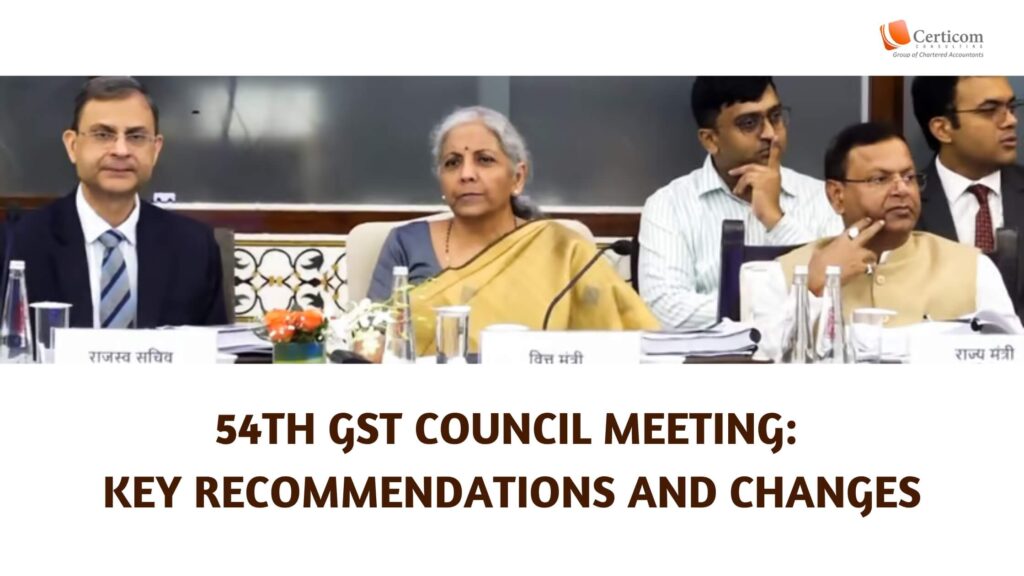54th GST Council Meeting: Key Recommendations and Changes

The 54th GST Council meeting, chaired by Union Finance Minister Nirmala Sitharaman, introduced several critical recommendations aimed at refining the Goods and Services Tax (GST) structure. These changes were focused on rate reductions, providing relief to individuals, and enhancing compliance mechanisms across various sectors.
Here’s a summary of the significant decisions taken at the meeting:
Major GST Rate Changes and Clarification
The Council recommended several changes to GST tax rates for goods and services, including:
Namkeens and Extruded/Expanded Savoury Food Products
The GST rate for extruded or expanded savory products, previously taxed at 18%, has been reduced to 12%, aligning them with namkeens and similar ready-to-consume products. This new rate applies prospectively.
Cancer Drugs
Life-saving cancer drugs such as Trastuzumab Deruxtecan, Osimertinib, and Durvalumab have seen a rate reduction from 12% to 5%. This change provides significant relief to patients battling cancer.
Metal Scrap
A Reverse Charge Mechanism (RCM) will now apply to metal scrap sold by unregistered persons to registered buyers, ensuring tax collection even if the supplier is under the registration threshold. Additionally, a 2% Tax Deducted at Source (TDS) on B2B transactions involving metal scrap will now be applicable.

Car and Motorcycle Seats
To bring parity between motorcycle and car seats, the GST rate for car seats has been increased from 18% to 28%, aligning them with motorcycle seat taxes.
Services – Life and Health Insurance
A Group of Ministers (GoM) was established to investigate GST-related issues in life and health insurance, with members from states like Bihar, UP, West Bengal, and Karnataka. The GoM will present its findings by October 2024.
Key Service Sector Clarifications:
Flying Training Courses: Approved flying training courses conducted by DGCA-approved Flying Training Organizations (FTOs) are now exempt from GST, benefiting aspiring pilots.
Research and Development (R&D) Services: The supply of R&D services by government entities, universities, or research associations using government/private grants will be exempt from GST. Past GST demands for such services will be regularized on an “as-is, where-is” basis.
Affiliation Services: Affiliation services provided by educational boards like CBSE are taxable, but services provided to government schools are now exempt. This exemption is retrospective and applies from 2017 to 2021.
Helicopter Passenger Transport: The Council introduced a 5% GST on passenger transport via helicopters on a seat-sharing basis, with retrospective regularization.
Compliance and Trade Facilitation Measures
In efforts to improve GST compliance and simplify processes, the Council introduced several key measures:
Waiver of Interest/Penalty
The Council recommended a new procedure for waiving interest and penalties for tax demands related to FYs 2017-18, 2018-19, and 2019-20. The last date for availing this benefit is March 31, 2025.
B2C E-Invoicing Pilot
After the successful implementation of e-invoicing in the B2B sector, the Council proposed a pilot program for B2C e-invoicing. This initiative aims to enhance transparency in retail transactions and allow customers to verify their invoices. The pilot will be voluntary and rolled out in selected states and sectors.
Invoice Management System (IMS)
A new IMS will allow taxpayers to accept, reject, or hold invoices for input tax credit purposes, thereby improving reconciliation and reducing errors.
Reverse Charge Mechanism Ledger and ITC Reclaim Ledger
The introduction of new ledgers for RCM and Input Tax Credit (ITC) reclaim will streamline GST return filing and simplify the process of declaring opening balances.

Other Amendments and Clarifications
- Renting of Commercial Property: Renting of commercial property from an unregistered person to a registered person will now fall under the Reverse Charge Mechanism (RCM), helping to prevent revenue leakage.
- Exports and Refund Clarification: Rule 96(10) related to refunds on exports has been simplified to expedite the refund process for exporters, removing previous procedural complexities.
The 54th GST Council meeting has set the stage for crucial reforms in India’s tax landscape, focusing on improving compliance, supporting key sectors like healthcare and education, and simplifying procedures for businesses. These changes not only provide immediate relief through tax reductions but also establish a foundation for a more streamlined GST framework in the future.
Related Post
Top 7 Income Tax Errors That Invite IT Notices
Resident’s Guide to Buying NRI Property in India
Book A One To One Consultation Now For FREE
How can we help? *



